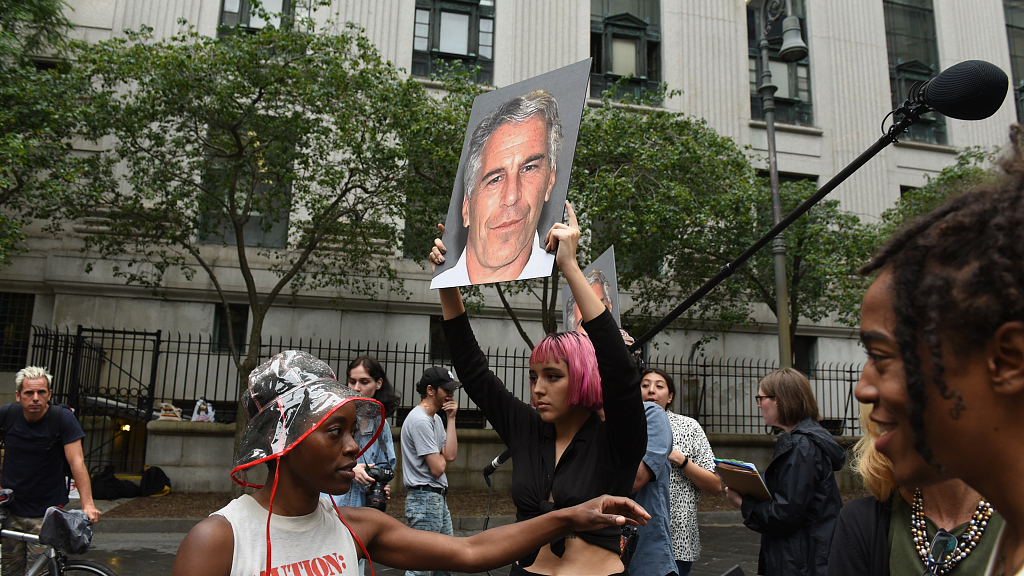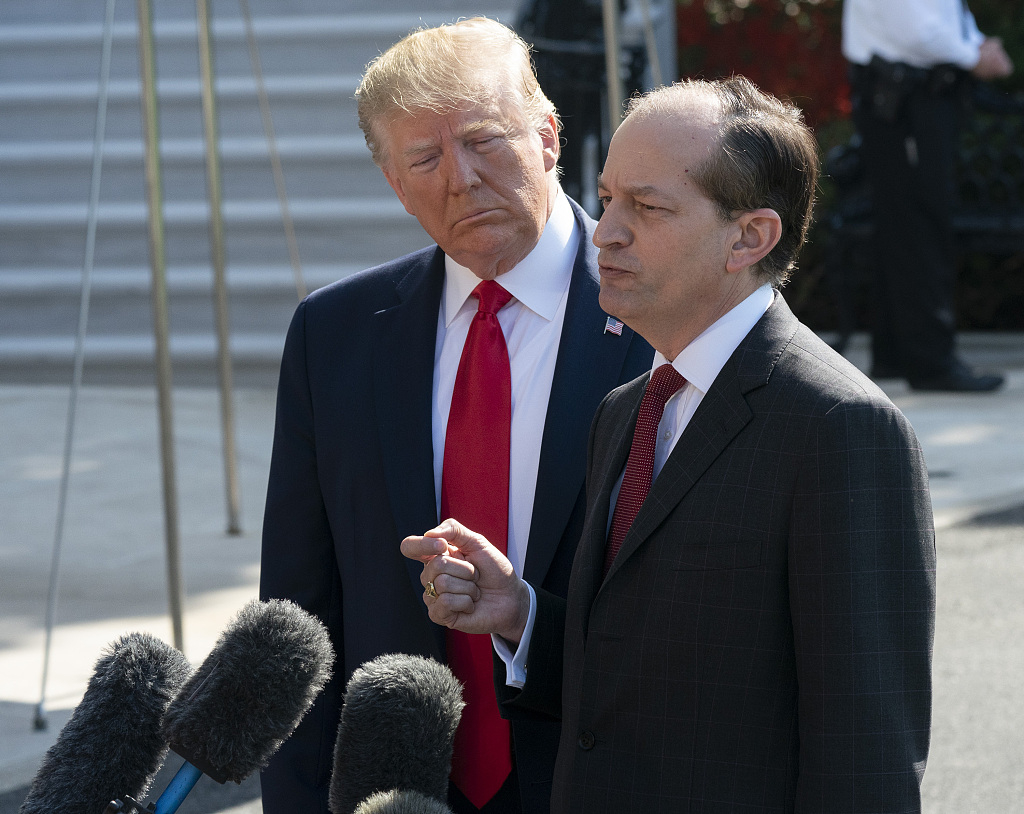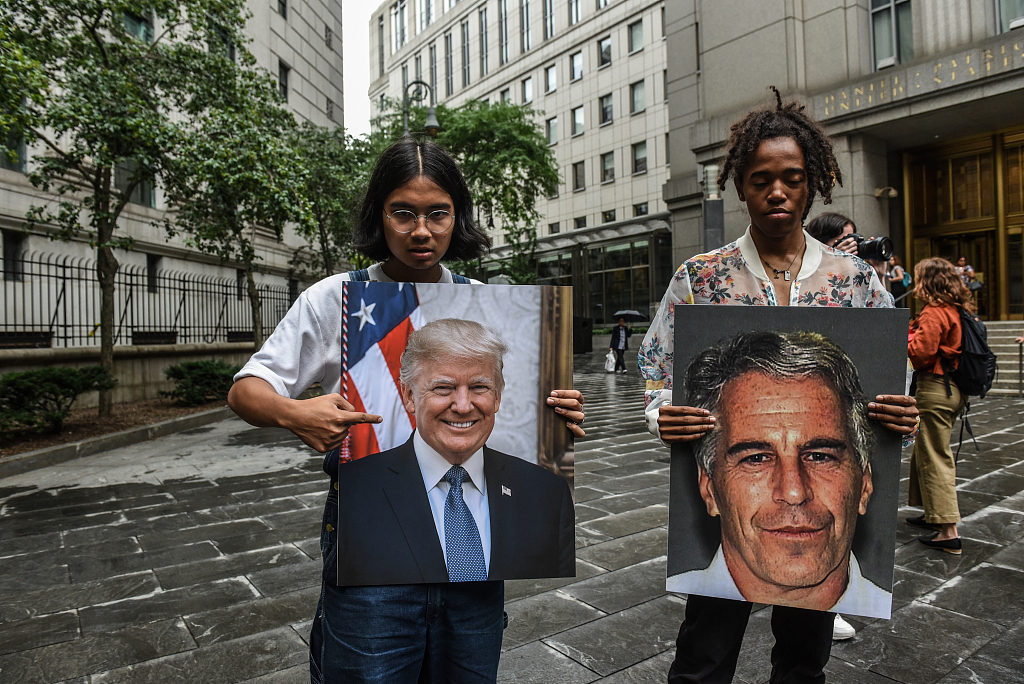

Editor's note: Tom Fowdy is a British political and international relations analyst and a graduate of Durham and Oxford universities. He writes on topics pertaining to China, the DPRK, Britain, and the U.S. The article reflects the author's opinions, and not necessarily the views of CGTN.
On Friday night U.S. Labor Secretary Alex Acosta resigned, following public criticism over his previous role as a Florida State Attorney in handling the case of businessman Jeffrey Epstein, who on Monday was arrested over alleged child trafficking charges. During his tenure in the Florida Legal system, Acosta was part of a deal which saw Epstein serve only 13 months in a local jail for child sex crimes. Although he has sought to defend his role in the 12 years-old case in legal terms, the public backlash amid Monday's arrest made his position untenable and, consequentially, he bowed out under pressure. As he departed, President Trump stated: "I'm with him."
Why is the Jeffrey Epstein scandal proving to be such a big deal? And why is it so damaging to anyone even loosely affiliated with it? The case might be described as "the tip of the iceberg" pertaining to broader and long set allegations of sexual crimes and misconduct throughout the rich, famous and powerful, not just specifically in America, but around the world. With Epstein's recent arrest, his well-known connections, and accusations about bribery and silencing witnesses have captured public anger deeply because people come to believe that this is just a part of a broader, deeper, and darker trend. The sentiment is clear: These predators may be weaponizing their wealth and connections to prevent and escape justice.
The fact that some within rich and high-profile circles are rumored to be engaging in sinister activities is not new. For many years, such allegations have been the subject of popular conspiracy theories and murky rumors. But they have often failed to be taken seriously by the mainstream. However, at the turn of the 2010s, the public atmosphere changed dramatically, by events not in Washington, but across the sea in the United Kingdom.

Former Secretary of Labor Alex Acosta speaking to the press after his resignation was announced by U.S. President Donald Trump in Washington D.C., U.S., July 12, 2019. /VCG Photo
In 2012, journalists uncovered allegations that former BBC television personality Jimmy Saville, who passed away the previous year, had in fact abused hundreds of minors over a period of 50 years. This earthquake of a revelation shined a new spotlight on abuse and corruption by elite figures. This was followed by a string of high profile arrests and prosecutions, as well as numerous more allegations. It spread from Britain and captured the horror of the broader Western world. The aftershock sank people's trust in public individuals and institutions. No more was the conceptualization of the rich, the famous, and the powerful engaging in sinister crimes a mere conspiracy theory, but a long set dark culture which had to be taken seriously.
By 2018, this sentiment finally broke through to the mainstream in the United States. The unleashing of the "#Metoo" movement saw a tidal wave of allegations poured upon famous people about sexual abuse of both women and minors. Age-old silences were broken, and several careers were destroyed, and legal cases pursued. The reasoning was all the same that certain individuals with influence used their position and wealth not only to engage in illegal activities but also to evade justice.
Thus, this brings us to the case of Jeffrey Epstein. Who is this man, and why does he matter? Jeffrey Epstein is an American investment banker who oversees a firm which manages the assets of billionaires. He has a net worth of over 500 million dollars. Such a background means he is very well-connected. This includes, with photographic evidence, ties with Donald Trump, as well as former Presidents such as Bill Clinton. In essence, Epstein is a keystone of what every day Americans may describe as "elite society."

Protesters holding up signs of Jeffrey Epstein and President Trump in front of the Federal courthouse in New York City, New York, U.S., July 8, 2019. /VCG Photo
As a result, the scandal surrounding him is creating burning distrust of "the establishment" from the grassroots. This is why there was no hope for Alex Acosta politically. Although nothing can be directly alleged or proven against the former Labor Secretary, Epstein's background, ties, and known usage of money in legal matters meant that even the slightest association with him is a political death sentence. Angered and severely disappointed, the public was not prepared to reason with it.
Thus, although little can be alleged or proven beyond Epstein himself, one thing is for sure that ordinary Americans feel that this case is just the tip of the iceberg. There is a belief that beneath the surface of elite life in the United States, a dark and pathological culture of abuse and corruption exists whereby certain individuals believe with their power, status, and assets, they can live above the law.
This is a case with real political wheels and momentum. It isn't going to go away, and its ramifications might prove to be deeper, more insightful, and shocking than people even realize.
(If you want to contribute and have specific expertise, please contact us at opinions@cgtn.com.)

Copyright © 2018 CGTN. Beijing ICP prepared NO.16065310-3
Copyright © 2018 CGTN. Beijing ICP prepared NO.16065310-3